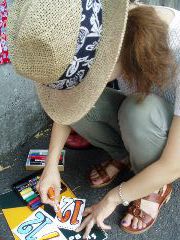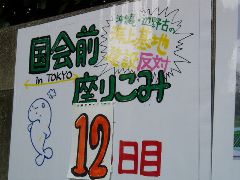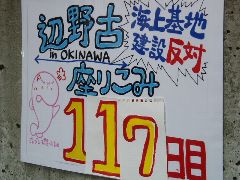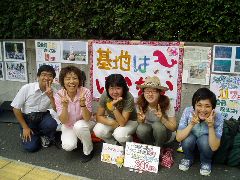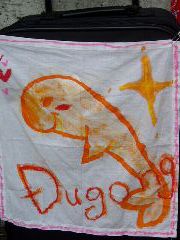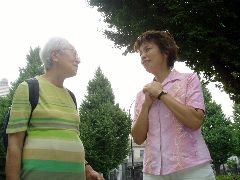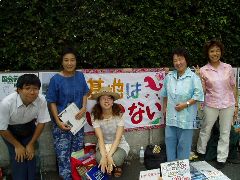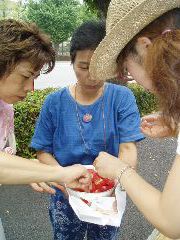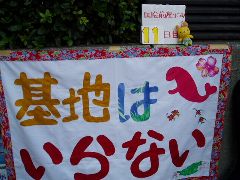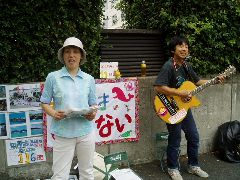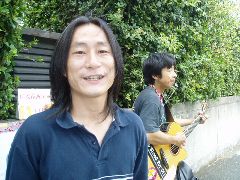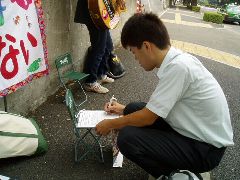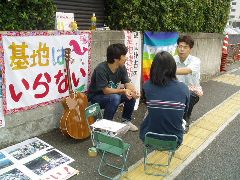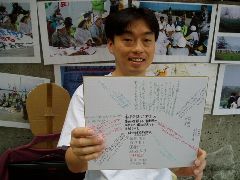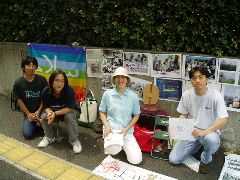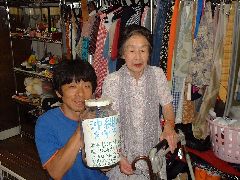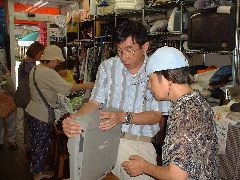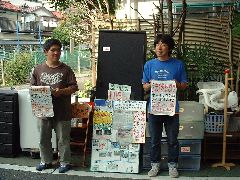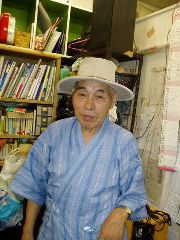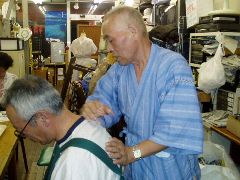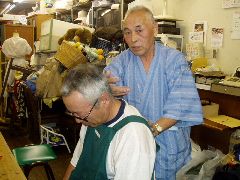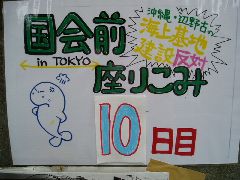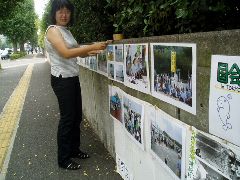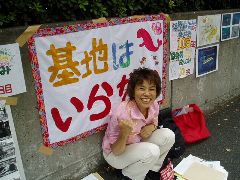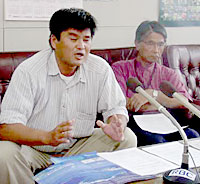The island idyll and the US occupation
For six decades, the inhabitants of Okinawa have lived alongside thousands of US
troops. But new plans for military expansion have provoked furious
resistance. David McNeill reports
12 August 2004
Natsume Taira is a mild-mannered,
bespectacled parson and pacifist in the Martin Luther King mode, but
he warns he will not be pushed too far. "If the authorities come
back with more people we'll be waiting for them," he says. "I'm not
a violent man but they're not going to get through."
It is a baking hot day in Henoko, a tiny fishing village in
Okinawa, Japan's southernmost prefecture. For 110 days, the reverend
and 8,000 supporters have been coming to this sun-bleached beach to
fight off government engineers trying to begin drilling surveys for
a proposed offshore helicopter base for the US military.
As the protest has dragged on, engineers and protesters, many in
their sixties, have scuffled. White-haired pensioners have gone
toe-to-toe with security guards and taken to canoes and wetsuits to
block the invaders. "I'm full of anger," 64-year-old Sakai Toyama
says. "How can they do this to this place? We already put up with so
much."
Okinawans live in one of the most beautiful places on earth, a
string of pristine islands dosed with ecological Viagra, anointed in
tropical sun, bathed in the azure-blue waters of the Pacific, and
coated with a lush carpet of green, spiked with palm trees.
The region has two claims to fame: the world's longest life-span
and one of the world's largest concentrations of US military bases.
The Americans invaded in 1945, mounting a savage attack that wiped
out a third of the local population and left 50,000 US troops killed
or injured. They never left.
In 1972, the islands reverted to Japanese rule but most of the
bases stayed. The bases already occupy a fifth of the main island
and include Kadena, the biggest and most active US Air Force base in
east Asia, and Futenma, which occupies 25 per cent of the
second-largest city, Ginowan.
Now, after years of promises by Tokyo and Washington to scale
down the military presence, the plan to build the Marine base,
1,500m by 600m, over a coral reef off Henoko to replace an older
base in Futenma has enraged the people. Takuma Higashionna, a
fisherman, says: "They're going to steal our livelihood and destroy
the local environment, and we're not going to stand for it."
Mr Higashionna has just returned from San Francisco where he
filed a suit against the US Defence Department, claiming the base
threatens the habitat of the imperiled dugong, a gentle sea mammal
classed as a "natural monument".
More than 50,000 US military personnel and dependants, including
17,600 Marines, are on Okinawa, which has a population of 1.3
million; the US military controls much of the land, sea and air,
including all air traffic up to 6,000m. Over the years, Okinawa has
sent off troops to wars in Korea, Vietnam, Afghanistan and Iraq, and
if war with China or North Korea comes, US troops from Okinawa will
fight it, whether the Okinawans like it or not.
Chalmers Johnson, a former CIA consultant and author of
Okinawa: Cold War Island, says: "It is simply unimaginable
that an ally would do this sort of thing. It's just an accident
waiting to happen.
"When [US Secretary of Defence] Donald Rumsfeld visited Okinawa
last November, he was told by the island's governor, 'You people are
on the active volcano and when it explodes it is going to bring down
your entire strategy in Asia in much the way the fall of the Berlin
Wall did for the USSR'. Building a 39th military base in Okinawa is
absurd."
The past four weeks or so have been typical, the people say, just
low-level stuff: On 8 July, a Marine major charged with the rape of
a Filipina base worker was convicted of molestation. On 16 July, an
Okinawan was hurt in a hit-and-run accident traced to a soldier at
Camp Hansen. On 23 July, a drunken off-duty Marine hit a policeman.
On 8 August, another Marine attacked a taxi driver. The day before,
the US Air Force had admitted that a 2.5kg piece of metal embedded
in the garden of a house had fallen from an F18C fighter in June.
The Okinawa Times made it the lead story and asked: "What if
children had been playing in the garden?"
Nothing major happened; nothing like the rage that overtook the
island in 1995 when two Marines and a sailor kidnapped and raped a
12-year-old girl and left her for dead, a crime that capped years of
brutal sex crimes. This is what happens, said the thousands who came
out in Okinawa's largest protest, when you train young men barely
out of their teens to kill like machines on a crowded island that
does not want them.
The gang rapists knew that if they made it back to base before
the police found out, they were safe under the Status of Forces
Agreement that protects US forces here, which is why most of the
rage was directed at the Japanese government that foists 75 per cent
of all US military bases in Japan on this little speck in the
Pacific. Islanders believe they are bearing the burden of
Japan's military alliance with the US and, with it, America's
military strategy for east Asia.
Shoichi Chibana is Malcolm X to Natsume Taira's Martin Luther
King, a firebrand famous on the island for burning the Japanese flag
on national television. "The Japanese government wants US military
protection but it knows they can never move these bases to the
mainland because there they would be kicked out," he says.
These days, Mr Chibana fights for the return of 236sq m of
ancestral land, part of 530,000sq m leased by Tokyo to the US
military. "Here, we're powerless so they get away with it. This is
the best place in the world for the US military. They love it here.
The Japanese government pays them \6,700bn (£32bn) a year. They pay
for their houses, their fuel, water, cars. The only thing the
government doesn't pay is the salaries of the soldiers."
The 1995 protests were a watershed and forced the US and Japanese
governments to agree to return Futenma Marine Corps air base to
Okinawa within five to seven years. The agreement was timed to greet
the arrival of Bill Clinton, then US president, who had come to
Japan to renew the US-Japan security treaty. Mr Clinton shook hands
with the then Prime Minister Ryutaro Hashimoto and the protesters
left the streets. Today, the return of Futenma is still 16 years
away and another base is being built.
Military planes constantly roar overhead and the narrow roads are
choked with green machines. The soundtrack to this pounding symphony
of moving machinery is Limp Bizkit, Nickelback and Slipknot, the
music that leeches from cars driven by military personnel and the
bars that cater to them. Most of these bars are on a strip outside
the main gate to Camp Hansen in the village of Kin, where riots
against the bases in the 1970s shook the shaky truce between the
military and the people to its core.
In one bar, the Japanese mama-san, who claims she knew R
Lee Emery, the pit-bull drill instructor in Full Metal
Jacket, says the Henoko protesters are "idiots", adding: "The
bases bring revenue."At 7pm, the bar is starting to fill with big,
tattooed men with boy's faces.
Major Michael Brown, the veteran convicted of molesting the
Filipina base worker in July, said about the Kin strip during his
trial: "GIs go to the bars and drink like fish, get into fights, and
pay mama-sans for the company of young ladies. Deals are made
for hand-jobs, blow-jobs, full, unadulterated sex, and just about
anything in between."
The area around the strip has been the site of dozens of rapes
and attempted sex assaults; few Okinawan women will go there after
dark. The word many islanders use to describe this situation is
"occupation".
Tatsuno Kuba, a mother raising four children in the shadow of
Kadena, says: "Why should they be able to stay and take all the best
land? Some people say the US soldiers are shut up in the bases, but
they can come out anytime they like to drink and play and grab local
women. We're locked out of our land.
"They train people to kill behind those fences. I can hear them
shouting all the time. Every day my house fills up with the smell of
gasoline, the windows shudder and the engines drown the kids'
lessons. And the planes roar over so close. It's only a matter of
time before they kill someone again."
Like most islanders, she knows planes regularly crash inside and
outside the bases. In the worst, in the 1950s, a jet fighter hit a
school, killing 17 children and injuring 121.
The Japanese government has responded to the anger by pouring in
cash from the public trough, and backing political conservatives
such as the present governor, Keiichi Inamine, who replaced the
fiercely anti-base Masahide Ota, who wrote in the Asahi
newspaper: "When local people are denied free use of their own land,
air and sea how could they be considered citizens of a free nation?"
The refrain from Tokyo and from the Governor's office is that if
the bases go the economy will collapse. Mr Ota says: "Base-related
revenues make up only 5 per cent of the total. There would be jobs
for 10 times more people if the US forces were to vacate their bases
in urban areas and the returned land was developed." He believes
Okinawa could earn much more from tourism. "The bases are hampering
the development of Okinawa's economy, not sustaining it."
The Henoko movement arrives at a crucial time. Washington is
experimenting with plans for a more mobile, decentralised military,
and, with South Korea increasingly chafing against the US presence
there, Japan is seen as the key regional centre of control.
Mr Johnson says: "The US must prevent what happened in Korea,
which is the more genuine anti-American democracy, and the Americans
there are just hated. Rumsfeld is not worried about democracy but he
knows Okinawa is prone to something that may be outside the control
of the government."
Douglas Lummis, a former Marine and now political scientist who
lives in Okinawa, says: "People have been saying for years, 'Of
course we don't want the bases'. Then they lower their voices and
say, 'But what can we do'. Now they have something. I think the
Henoko battle will be won and it will
energise the anti-base
movement."
The Rev Taira says the islanders have had enough. "The soldiers
get drunk and crash their cars. There are four accidents a day; two
rapes a month. Almost every person on Okinawa has a family member
who has been assaulted. Then the soldiers go off to kill poor people
in Iraq and Afghanistan. It makes my blood boil."
| 